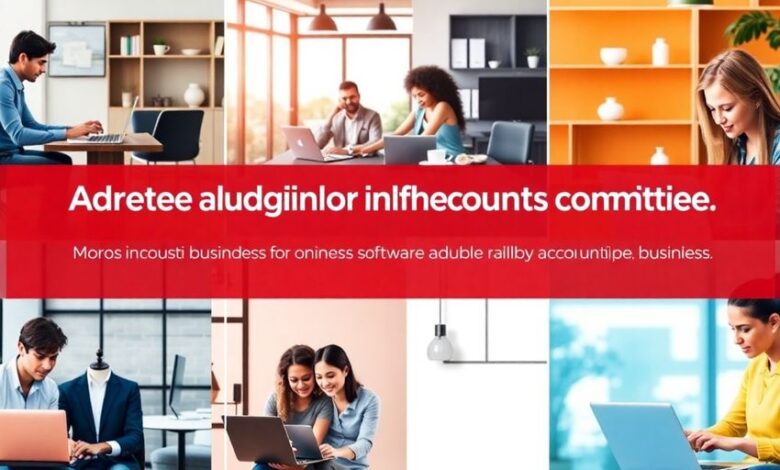Choosing the Right Accounting Software for Multiple Businesses: A Comprehensive Guide

Managing several businesses can be a real headache, especially when it comes to keeping track of finances. Without the right tools, you might find yourself overwhelmed and buried in paperwork. That’s where accounting software for multiple businesses comes into play. This guide will help you understand what to look for in such software, the benefits it offers, and some top choices available today.
Key Takeaways
- Look for software that supports multiple companies in one platform.
- Choose solutions that can grow with your business as you add more entities.
- User-friendly interfaces can make a big difference in adoption and daily use.
- Consider software that helps automate tasks to save time and reduce errors.
- Always check for security features to protect sensitive financial data.
Key Features to Look for in Accounting Software for Multiple Businesses
Multi-Company Support
First and foremost, the software must handle multiple companies. This isn’t just about having separate files; it’s about true integration. You need to manage data across different entities—subsidiaries, legal entities, or international branches—all from one central location. Think of it as a command center for your entire business empire. Without this, you’re just creating more work for yourself.
Scalability and Integration
Can the software grow with you? As you add more businesses, the software needs to handle the increased load without slowing down or becoming a nightmare to manage. It should also play nice with other tools you use.
- CRM systems
- eCommerce platforms
- Payroll services
Scalability isn’t just about handling more data; it’s about adapting to changing business needs. The software should be flexible enough to accommodate new workflows, reporting requirements, and compliance regulations as your business evolves.
User-Friendly Interface
Let’s be honest, accounting can be complex enough without adding a clunky, confusing software interface to the mix. The software should be intuitive and easy to use, even for those who aren’t accounting experts. A clean, well-designed interface can save you time, reduce errors, and make the whole process less painful. If your team hates using the software, they won’t use it effectively.
Benefits of Using Accounting Software for Multiple Businesses

Okay, so you’re running more than one business. That’s awesome, but also… complicated. Let’s talk about why getting the right accounting software can be a total game-changer.
Consolidation of Financial Data
The biggest win here is having all your financial info in one place. No more jumping between different programs or spreadsheets for each business. It’s all consolidated, giving you a clear, unified view of how your entire operation is doing. This makes it way easier to spot trends, compare performance across businesses, and make smart decisions.
Increased Efficiency
Think about all the time you spend on bookkeeping tasks. Now multiply that by the number of businesses you own. Yikes! Good accounting software automates a lot of that stuff, like invoicing, expense tracking, and reporting. This frees up your time to focus on, you know, actually running your businesses. Plus, automation reduces the risk of errors, which can save you headaches down the road.
Enhanced Compliance
Tax season is stressful enough without having to worry about whether you’ve dotted all your i’s and crossed all your t’s for multiple companies. Accounting software helps you stay on top of tax obligations and financial reporting requirements for each business. It can generate reports, track deductions, and even help you prepare for audits. Basically, it’s like having a virtual assistant that keeps you out of trouble with the IRS.
Using accounting software for multiple businesses isn’t just about saving time; it’s about gaining control and clarity over your entire financial landscape. It allows you to make informed decisions, optimize performance, and ultimately, grow your businesses more effectively.
Top Choices for Accounting Software for Multiple Businesses
Alright, so you’re juggling multiple businesses and need accounting software that can keep up. It’s a common problem! Luckily, there are some solid options out there. Let’s take a look at a few that are getting some buzz.
SoftLedger
SoftLedger is known for its strong general ledger capabilities. It’s designed for businesses that are ready to move on from basic platforms like QuickBooks. A big plus is how easily you can consolidate financial data across all your different companies. If you’re finding that your current setup just isn’t cutting it anymore, SoftLedger might be worth a look. It’s built to handle the complexities of multi-entity accounting.
FreshBooks
FreshBooks aims to be an all-in-one accounting solution, which is pretty appealing when you’re managing multiple ventures. From creating invoices to tracking expenses, it offers a range of tools to help you stay on top of your finances. It’s all under one roof, which can simplify things. You can easily manage your bookkeeping needs with [FreshBooks features](#424e].
Fina Money
Fina Money is set to launch soon and is introducing a multi-profile feature. Keep an eye on this one, as it could be a game-changer for managing multiple businesses. It’s always good to have new options on the horizon, especially ones designed with multi-business management in mind.
Choosing the right software really depends on your specific needs. Think about what’s most important to you – consolidation, ease of use, scalability – and then see which of these options fits the bill. Don’t be afraid to try out a few demos before making a decision.
How to Choose the Right Accounting Software for Multiple Businesses
Okay, so you’re juggling multiple businesses and need accounting software that won’t make you want to pull your hair out. It’s a big decision, but let’s break it down. It’s not just about picking the shiniest new thing; it’s about finding something that actually fits your needs.
Assess Your Business Needs
First things first, know thyself (or, in this case, know thy businesses). What are your biggest pain points? Are you drowning in spreadsheets? Do you need better reporting? Write down everything you need the software to do. Think about the number of transactions you process, the complexity of your financial reporting, and any specific industry requirements. This will help you narrow down your options.
Evaluate Software Features
Now, let’s talk features. Not all accounting software is created equal. Here’s what to look for:
- Multi-entity support: This is a no-brainer. Make sure the software can handle multiple companies or business units without making you jump through hoops. Sage Intacct is a good option for this.
- Consolidated reporting: You need to be able to see the big picture. The software should allow you to easily consolidate financial data from all your businesses into a single report.
- Customization: Can you tailor the software to fit your specific needs? Look for options to customize reports, dashboards, and workflows.
- Integration: Does it play well with your other tools? Make sure it integrates with your bank accounts, payment processors, and other business systems.
Consider User Experience
Let’s be real, you’re going to be spending a lot of time with this software. If it’s clunky and confusing, you’re going to hate your life. Look for a user-friendly interface that’s easy to navigate. Most software offers free trials, so take advantage of them! Get your team involved and see what they think.
Choosing the right accounting software is like finding the perfect pair of jeans. It needs to fit just right, be comfortable, and make you feel good. Don’t settle for something that’s just okay. Take your time, do your research, and find the software that’s the best fit for your business.
Common Challenges in Managing Multiple Businesses
Managing multiple businesses simultaneously can feel like juggling chainsaws – exciting, but also pretty risky if you’re not careful. It’s not just about keeping the books balanced; it’s about navigating a whole host of potential pitfalls that can trip you up if you’re not prepared. Let’s look at some common challenges.
Data Security and Privacy Concerns
Having all your financial data in one place is super convenient, but it also makes you a bigger target. Data security becomes a major concern when you’re dealing with multiple businesses. You need to make sure the accounting software you choose has robust security measures in place to protect sensitive information from cyber threats. It’s worth checking if they comply with industry standards and have safeguards to prevent unauthorized access. Think of it like this: the more valuable the treasure, the stronger the lock needs to be.
Managing Complex Workflows
One size definitely doesn’t fit all when it comes to accounting workflows across different businesses. Even if you try to standardize processes, each entity will have its own unique quirks and considerations. Accounting software needs to be flexible enough to accommodate these differences without turning into a tangled mess. It’s about finding a balance between standardization and customization to keep things running smoothly.
Cost Management
Keeping track of expenses across multiple businesses can quickly become a headache. It’s easy to lose sight of where your money is going, which can impact your bottom line. You need a system that allows you to monitor costs effectively and identify areas where you can save money.
Managing costs effectively is crucial for maintaining profitability across all your ventures. It’s about more than just tracking expenses; it’s about understanding where your money is going and making informed decisions to optimize spending.
Here are some ways to manage costs:
- Implement a centralized budgeting process.
- Regularly review expenses and identify areas for savings.
- Use accounting software to track and analyze spending patterns.
Seeking Professional Advice for Software Selection

Choosing the right accounting software can feel like a huge task, especially when you’re juggling multiple businesses. It’s easy to get lost in all the features and promises. Sometimes, the best move is to bring in some outside help. Let’s explore how getting professional advice can make this process smoother.
Consulting Financial Advisors
Financial advisors can bring a lot to the table. They’ve seen it all, from tiny startups to sprawling enterprises. They can help you understand your business needs in a way that you might not have considered before. They can look at your current processes, identify pain points, and then suggest software solutions that actually address those issues. It’s like having a translator who speaks both business and tech.
Utilizing Software Comparison Tools
There are tons of software comparison tools out there, and they can be super helpful for narrowing down your options. These tools let you compare features, pricing, and user reviews side-by-side. However, don’t rely on them completely. They’re a great starting point, but they can’t replace personalized advice. Think of them as a way to create a shortlist before you dive deeper.
Gathering User Feedback
User reviews can be a goldmine of information. Reading about other people’s experiences with different software can give you a realistic view of what to expect. Look for reviews from businesses that are similar to yours in size and industry. Pay attention to both the good and the bad – what are people raving about, and what are their biggest complaints? This can help you avoid making a costly mistake. For example, consolidated reporting is a key feature to look for.
Getting advice from people who’ve been there can save you a lot of time and frustration. It’s like learning from someone else’s mistakes instead of making them yourself. Plus, they can offer insights that you wouldn’t find in any sales brochure.
Future Trends in Accounting Software for Multiple Businesses
The world of accounting software is always changing, and for those managing multiple businesses, staying ahead of the curve is super important. We’re seeing some exciting developments that promise to make things easier and more efficient. Let’s take a look at what’s coming.
AI and Automation Integration
AI is set to transform accounting software, especially for multi-business management. Imagine software that can automatically categorize transactions, reconcile accounts, and even predict cash flow across all your businesses. This isn’t just about saving time; it’s about reducing errors and freeing up accountants to focus on more strategic tasks. AI-powered automation is becoming more sophisticated, offering deeper insights and better control over your finances.
Cloud-Based Solutions
Cloud-based accounting software is already popular, but it’s becoming even more essential for managing multiple businesses. The ability to access your financial data from anywhere, at any time, is a game-changer. Plus, cloud solutions often come with automatic updates and backups, so you don’t have to worry about losing important information.
- Real-time collaboration becomes easier.
- Scalability is enhanced, allowing you to add or remove businesses as needed.
- Data security is often improved with advanced encryption and security measures.
Enhanced Data Analytics
Accounting software is moving beyond just recording transactions; it’s becoming a powerful tool for data analysis. With enhanced data analytics, you can gain a better understanding of the financial performance of each of your businesses, as well as your overall portfolio. This can help you make more informed decisions about where to invest your resources and how to improve profitability.
The future of accounting software for multiple businesses is all about integration, automation, and insight. By embracing these trends, you can streamline your financial management and gain a competitive edge.
Wrapping It Up
Managing several businesses can be a real challenge, but the right accounting software can make things a lot easier. By choosing a tool that fits your needs, you can simplify your financial tasks and keep everything organized. Options like SoftLedger, FreshBooks, and the soon-to-launch Fina Money offer great features to help you manage your finances across different companies. Just remember to think about what you really need—like how many businesses you have, what features matter most, and how much you’re willing to spend. Picking the right software can really help you stay on top of your finances and set your businesses up for success.
Frequently Asked Questions
Why should I use special software for multiple businesses instead of just using spreadsheets?
Spreadsheets might work for simple cases, but they can get messy and cause mistakes as your business grows. Special software helps you manage everything better and saves time.
What should I look for in accounting software for multiple businesses?
You need software that can handle multiple accounts, is easy to use, and can grow with your business. It should also help you with reports and keep your data safe.
Are there free accounting software options that can handle multiple businesses?
Free software can be helpful when you start, but they usually lack important features needed for managing several businesses.
How does accounting software help with financial reports?
Good accounting software can automatically create reports that show how each business is doing, making it easier to see the big picture.
What are some challenges of using accounting software for multiple businesses?
You might face issues like keeping your data secure, managing different workflows for each business, and making sure the software fits your budget.
Why is it important to seek professional advice when choosing accounting software?
Consulting with financial experts can help you understand your specific needs, ensuring you choose the right software that fits your business structure.



